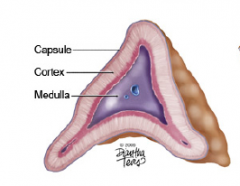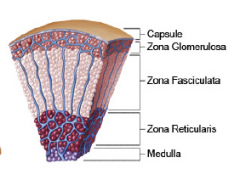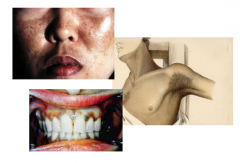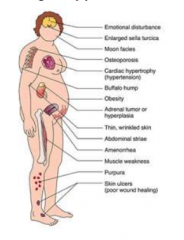![]()
![]()
![]()
Use LEFT and RIGHT arrow keys to navigate between flashcards;
Use UP and DOWN arrow keys to flip the card;
H to show hint;
A reads text to speech;
18 Cards in this Set
- Front
- Back

|
Transverse Section (adrenal gland cross sections) |
|

|
Microscopic Section (adrenal glands cross sections) |
|
|
sodium saver-stimulates sodium conservation and potassium elimination; increases sensitivity of tastebuds to salt to encourage water consumption |
Aldosterone
(mineralocorticoids) |
|
|
Is excreted in response to low blood volume or pressure, low sodium |
mineralocorticoids |
|
|
Cortisol (>cortisone) |
glucocorticoids |
|
|
(glucocorticoids)
Increases blood sugar by converting protein to carbs |
results in muscle wasting |
|
|
(glucocorticoids) Promotes vasoconstriction to : |
: increase BP |
|
|
(glucocorticoids) • Anti-inflammatory effects• XS production due to chronic stress: |
:increase blood glucose and pressure, decreased resistance to disease |
|
|
adrenal insufficiency,or hypocortisolism |
Addison's disease |
|
|
The disease is characterized by weightloss, muscle weakness, fatigue, low bloodpressure, and sometimes darkening of theskin in both exposed and nonexposedparts of the body. |
Addison's disease |
|
|
Addison's disease occurs when the adrenalglands do not produce enough of the hormone: |
:cortisol and, in some cases, the hormone aldosterone. |
|

|
Addison's disease |
|

|
Cushing's-hypercortisolism |
|
|
• Patients who are obese and have type 2 diabetes, withpoorly controlled blood glucose and high blood pressurehave an increased risk of developing the disorder.• upper body obesity a rounded face, increased fat aroundthe neck, and relatively slender arms and legs.• severe fatigue• weak muscles• high blood pressure• high blood glucose• increased thirst and urination• irritability, anxiety, or depression• Children tend to be obese with slowed growth rates. |
hypercortisolism, Cushing's syndrome |
|
|
occurs when the body's tissues are exposed to high levels of cortisol for too long. |
cushing's syndrome |
|
|
Many people develop Cushing's syndrome becausethey take glucocorticoids-steroid hormones thatare chemically similar to naturally produced : |
:cortisol—such as prednisone for asthma, rheumatoid arthritis, lupus, and other inflammatory diseases. |
|
|
Glucocorticoids are also used to suppress the immune system after : |
:transplantation to keep the body from rejecting the new organ or tissue. |
|
|
Other people develop Cushing's syndrome because their bodies produce too much: |
:cortisol |

